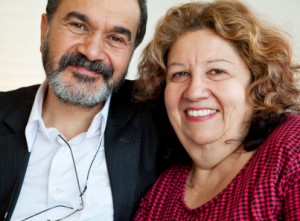 Have you ever had a long-distance relationship? If so, then you might know what hurdles to expect when it comes to dating and moving forward with your love interest.
Have you ever had a long-distance relationship? If so, then you might know what hurdles to expect when it comes to dating and moving forward with your love interest.
For those of you who haven’t and are wondering what to do, if you should even pursue someone who lives in another city, another state, or even another country, there are a few questions you can ask yourself to put that anxiety at rest. After all, you don’t know where the relationship is headed – this takes time and getting to know each other more and more deeply.
So how do you really get to know someone intimately when it’s long distance? You don’t have the luxury of seeing them whenever you want, so you have to build the relationship in another way.
I spoke recently to a man from the UK who was dating a woman in New York. He said they met while he was visiting, fell for each other, and kept a long-distance relationship going for a couple of years before they married. He was happy to stick it out, and perhaps you will be, too.
Following are some questions to ask yourself first:
How flexible can you be?
This means, do you have disposable income, frequent flier miles, or time off at work? These things are essential in the budding stages of long-distance romance. It’s important to make the time to see each other, so you can keep the relationship moving forward. This means a little more sacrifice of time and money, which some people aren’t willing to give. So be honest with yourself – will you get resentful of how much money you’re spending? Will you expect him to visit more, or will you split expenses equally? Knowing where you stand helps curb resentment in the long run.
Do you use technology?
With apps like Skype and our cell phones practically attached to our bodies, there’s no excuse for being out of touch. Long-distance relationships will fare better when you utilize the tools available. If you’re not comfortable Skyping or texting or calling, then you may want to reconsider. These things all matter and contribute to making the relationship last.
Are you trusting?
Maybe your last boyfriend broke your heart by cheating, and since then you haven’t been able to trust a man unless you know where he is and who he’s with. This doesn’t really work for long-distance relationships. There has to be a level of honesty and trust, because you’re not around each other and you can’t check in with each other all the time. You each have your lives where you live, and then you have your relationship together. If you question his feelings about you or his intentions with the relationship every time you speak to him, you might create problems that don’t exist. Think about your tendencies before you know whether you can handle the distance.
Are you looking at the future?
It’s important for both parties to make concrete plans about your goals and future – and when you can live in the same city. It’s important to have a plan moving forward, so that the relationship has a real chance. You can’t live apart feasibly forever. While romantic reunions for a long weekend here and there are fun, it takes living in the same city and being part of each other’s daily lives to see if things could work in the long run.
 Dating can be a complicated endeavor, even more so when considering your religious beliefs and practices. If you have a strong faith, then you might be more comfortable dating people with the same religious background so that you can attend services together or agree to raise children with certain religious customs. However, if you aren’t particularly religious, you are probably open to dating people of other faiths.
Dating can be a complicated endeavor, even more so when considering your religious beliefs and practices. If you have a strong faith, then you might be more comfortable dating people with the same religious background so that you can attend services together or agree to raise children with certain religious customs. However, if you aren’t particularly religious, you are probably open to dating people of other faiths.
It’s important to know how strong your feelings are when it comes to religious beliefs and practices, so you are able to understand and discuss these beliefs with anyone you date. The best piece of advice to follow is: be true to yourself.
So if you’re thinking of dating (or are dating) a Jewish woman, or joining a Jewish Dating Site, there are a few things to consider before you get serious:
Talk about it.
If you have a strong faith, then it’s important to bring this up to your date early in the relationship. Just because you have the same religious background doesn’t mean that you have all the same beliefs, opinions, and customs. What if she doesn’t go to services except for high holidays? What if she doesn’t have Shabbat dinners on Friday nights? What if she has no desire to keep kosher? It’s important to talk about how religious each of you are, and to understand how your date feels. If either of you aren’t willing or able to compromise, then it’s important to let each other know right from the start. If you are both more relaxed about your religious practices, then you have more room to compromise as the relationship progresses.
Understand the customs.
It’s important to know her particular religious customs, especially if you’re not Jewish. Does she keep a kosher kitchen, or have a Mezuzah hung on her doorpost? Are these things important to her? Find out what religious customs and practices she keeps and see if this is something you’re willing to do with her.
Don’t assume anything.
Each person has her own unique perspective, beliefs, and traditions – because we were all raised differently and have different experiences – so don’t just assume that if you’re the same religion you’ll be in sync. Opinions about politics, movies, education, career path, or anything else varies from one person to the next, so don’t assume your date bases her beliefs around a religious ideal. It’s important to get to know your date and ask questions to find out where she’s coming from, and it also helps to give you a chance to see things from a new perspective, which is always beneficial. Don’t make assumptions.
Don’t try to change your date.
If you have strong beliefs and your date isn’t very religious, don’t assume she will convert or start going to services with you. Or if she has a very strong Jewish faith and you’re a Christian, don’t assume she’ll relax on going to services or give it up for you. If faith plays an integral part of her life, then it’s important to accept and support it. If you can’t come to an agreement about your religious practices, then maybe it’s best to move on.
